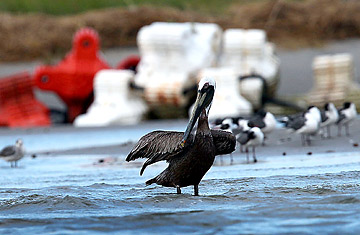
A pelican tries to clean its wings on an island littered with protective booms, May 27, 2010, near Grand Isle, La.
Glenn Dufrene has lived his whole life on the Louisiana bayou, and he treasures its boggy natural beauty. When he got the chance this month to work with a crew protecting the coast from the massive Deepwater Horizon oil-rig spill in the Gulf of Mexico, the 47-year-old truck and airboat driver headed for the Mississippi River delta town of Venice, on Louisiana's southwestern tip. Dufrene says it was sad enough this week to see the oil slick, about two inches thick in some places, arrive at the ecologically fragile marshes to the west — despite efforts to contain it with plastic booms. Those marshes will be far more difficult to restore than the beaches will be. But he got an added kick in the gut for his Memorial Day weekend when his boat returned to Venice Saturday night.
Shortly before Dufrene and his crew docked, British Petroleum announced that its attempt to top kill, or plug, the deep-ocean drill-pipe leak had failed. That meant that the spill, which after more than a month of spewing crude into the Gulf is already the worst man-made environmental disaster in U.S. history, will continue for weeks, if not months, as BP tries alternative ways to subdue it. It also means cleanup workers like Dufrene are likely have a more daunting job ahead of them. "I can't describe to you how much that news hurt today," Dufrene said as he nursed a beer at Crawgator's Bar & Grille at the Venice marina, where commercial and recreational fishing boats have been bobbing idle since a local fishing ban was imposed earlier in the month due to the oil contamination. "This is the first moment I've felt like maybe we could lose some of these precious swamplands."
Dufrene's reaction was echoed throughout the bayou from shrimp boaters who've watched the Deepwater spill steal their livelihoods this year to residents attending the annual seafood festival this weekend in Plaquemines parish, which includes Venice — and wondering if they'll be able to enjoy one next year. The spill is "going to destroy south Louisiana," Plaquemines parish president Billy Nungesser, a sharp critic of BP's and the Obama Administration's responses to the oil catastrophe, told reporters after getting word of the top-kill failure. "We are dying a slow death here, and we don't have time to wait while they try solutions. Hurricane season starts on Tuesday."
BP's next solution is twofold. The immediate move is to place a cap at the top of the broken drill-pipe apparatus, or riser, some 5,000 feet below the surface to siphon the oil up via a new riser. "We expect to capture most of the oil" that way, BP chief operating officer Doug Suttles said at a news conference Saturday. The procedure, however, could take as long as a week. Another strategy, which would actually stop the spill itself (as the top-kill method of blasting mud and junk into the leak attempted to do), is to drill relief wells. Those could take two to three months to complete.
Environmentalists were also chagrined by Saturday's news, but not all that surprised. "It's just another indicator that BP didn't have a plan in place for confronting this kind of spill," says Karla Raettig, director of coastal Louisiana restoration for the National Wildlife Federation. At this point, Raettig adds, "BP and the [federal] government have also got to focus more of their attention on the science of remedying the damage," including better reconnaissance efforts to determine exactly where the spill is headed and laying out some 3 million feet of containment booms more effectively.
BP and the government have some 20,000 cleanup workers in place, under the direction of Coast Guard Admiral Thad Allen. Saturday's setback makes President Obama's plans to triple that number all the more important, especially since scientists and even BP now acknowledge the spill is disgorging as much as 50,000 barrels of oil each day into the Gulf. It may also generate more public support for the efforts of Plaquemines Parish's Nungesser and Louisiana Governor Bobby Jindal to get barrier islands of dredged sand constructed offshore to intercept the encroaching slick. Allen, after receiving approval for the idea from the Army Corps of Engineers, last week okayed six sand berms, though many scientists say they're skeptical of the barriers' effectiveness and concerned they might do their own eco-damage.
But even if the barrier island clamor from Jindal and Nungesser, both Republicans, is political grandstanding, Saturday's disappointment was a reminder of how the spill has damaged the standing of both Obama and BP, especially at ground-zero locales like Venice. Cody Mouton, 35, a Louisiana bayou boat captain, says he's worked with BP in the past and was impressed by "how safety-conscious the company always seemed to be." Now, using his 27-foot boat to help with the cleanup, he wonders "why the Obama Administration didn't realize this was an urgent government issue as soon as the first drop of oil hit the water" — or even "if BP really seems to understand what's happening to what we grew up with here, what we rely on to live." After Saturday's news, says Mouton, looking out at the Gulf from the Venice docks, "I worry that we've just seen the tip of this oil iceberg."
